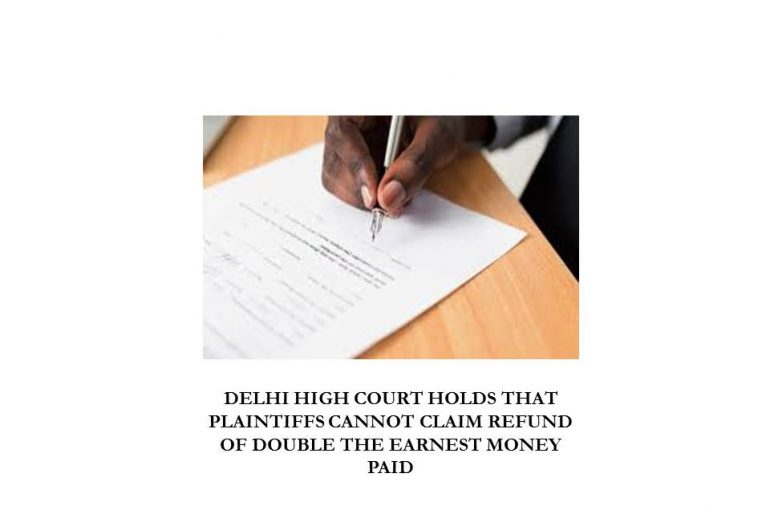DELHI HIGH COURT HOLDS THAT PLAINTIFFS CANNOT CLAIM REFUND OF DOUBLE THE EARNEST MONEY PAID
A Single Judge Bench of the Hon’ble High Court of Delhi passed a Judgment dated 23-03-2022 in the case of Kulmohan Singh & Anr. v. Satinder Bhasin & Anr. CS(OS) 301/2020 and held that the Plaintiffs cannot recover double the earnest money paid to the Defendants in a recovery suit.
In the present case, one Mr. Kulmohan Singh (Plaintiff/Buyer) entered into an Agreement to Sell (Agreement) with one, Mr. Satinder Bhasin (Defendant/Seller) on 07-01-2019 in respect of a property situated at D-24, Rajouri Garden, New Delhi-110027, admeasuring 1151 sq. yards (Suit Property) for a total consideration of Rs. 38.5 Crores. In pursuance thereof, the Plaintiffs paid an amount of Rs. 3.85 Crores on 07-01-2019 and Rs. 2.00 Crores on 03-02-2019 to the Defendants i.e. a total of Rs. 5.85 Crores as earnest money.
However, the said Agreement was not executed. As a result, the Plaintiff filed a Suit for Recovery being CS(OS) 301/2020 for a sum of Rs. 5.85 Crores along with interest of Rs.1,43,75,000/- before the Hon’ble High Court of Delhi (High Court). The Plaintiff/Buyer sought attachment of the Suit Property by invoking provisions of Order XXXVIII Rule 5 Code of Civil Procedure, 1908 (CPC) (Where defendant may be called upon to furnish security for production of property) or a direction to the Defendants to provide security to the extent of liability and to restrain them to not create any third-party interest against the Suit Property. It was also contended that since the Defendants have enjoyed the benefit of amount given by the Plaintiffs, so, the Plaintiffs are entitled to refund of the amount with interest @15% p.a. The said amount of Rs. 5.85 Crores was disputed by the Defendants.
For reference, Order XXXVIII Rule 5 CPC is reproduced below:
“Where defendant may be called upon to furnish security for production of property.-
(1) Where, at any stage of a suit, the Court is satisfied, by affidavit or otherwise, that the defendant, with intend to obstruct or delay the execution of any decree that may be passed against him,-
a) is about to dispose of the whole or any part of his property, or
b) is about to remove the whole or any part of his property from the local limits of the jurisdiction of the Court, the Court may direct the defendant, within a time to be fixed by it, either to furnish security, in such sum as may be specified in the order, to produce and place at the disposal of the Court, when required, the said property or the value of the same, or such portion thereof as may be sufficient to satisfy the decree, or to appear and show cause why he should not furnish security.
(2) The plaintiff shall, unless the Court otherwise directs, specify the property required to be attached and the estimated value thereof.
(3) The Court may also in the order direct the conditional attachment of the whole or any portion of the property so specified.
(4) If an order of attachment is made without complying with the provisions of sub-rule (1) of this rule, such attachment shall be void.”
The High Court passed an ex-parte Interim Stay Order dated 12-10-2020, thereby restraining the Defendants from creating third party rights in the Suit Property. The Plaintiffs informed the High Court that the Defendants had assured the Plaintiffs that they were the owners of the Suit Property and therefore had right to sell the Property, but the same is under charge/ has been mortgaged with HDFC Bank. Further, the Defendants had also assured the Plaintiffs that they would obtain “No Objection Certificate” (NOC) from HDFC Bank and the Suit Property shall be made free from all encumbrances, liens, decree, court cases, attachments, outstanding dues, charges, tax penalties etc., before the registration of sale deed in favour of the Plaintiffs.
After perusing the facts of the case and taking into consideration the arguments advanced by the Parties to the dispute, the High Court while placing reliance on the case of Raman Tech. & Process Engg. Co. Vs. Solanki Traders (2008) 2 SCC 302 reiterated the decision wherein the Apex Court had held that “5. The power under Order 38 Rule 5 CPC is a drastic and extraordinary power. Such power should not be exercised mechanically or merely for the asking. It should be used sparingly and strictly in accordance with the Rule. The purpose of Order 38 Rule 5 is not to convert an unsecured debt into a secured debt. Any attempt by a plaintiff to utilise the provisions of Order 38 Rule 5 as a leverage for coercing the defendant to settle the suit claim should be discouraged. Instances are not wanting where bloated and doubtful claims are realised by unscrupulous plaintiffs by obtaining orders of attachment before judgment and forcing the defendants for out-of court settlements under threat of attachment.”
The High Court held that “testing the applicability of provisions of Order XXXVIII Rule 5 of the Civil Procedure Code to the case in hand, this Court finds that by seeking attachment of the suit property, plaintiffs are in fact trying to secure the amount over and above the amount of which decree is sought against the defendants in the main suit, whereas only an amount of Rs.40,00,000/- has been paid through bank transaction, which is still to be proved whether the plaintiffs are liable to recover double of the earnest money or defendants are entitled to forfeit the same.”
The High Court while disposing of the Applications vacated the Stay Order dated 12-10-2020 and passed a direction that in case the Defendants sell the Suit Property, out of the sale proceeds a sum of Rs.50,00,000/- shall be deposited with the Registrar General of the Court within one week of sale thereof, which shall be subject to outcome of the Suit.
Suchitra Upadhyay
Associate
The Indian Lawyer & Allied Services





































Leave a Reply